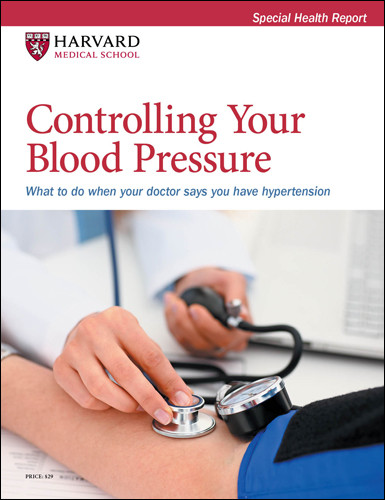Pressure shift
Doctors are changing the way they manage high blood pressure.
- Reviewed by Toni Golen, MD, Editor in Chief, Harvard Women's Health Watch; Editorial Advisory Board Member, Harvard Health Publishing; Contributor

High blood pressure is so common among older women that it might be easy to believe all it takes to control it is a single drug.
But the reality is far different — and often frustrating. The average person needs two or three prescriptions to manage her blood pressure, as well as continual monitoring to tweak types and doses as she gets older, says Dr. Randall Zusman, director of the Division of Hypertension at Harvard-affiliated Massachusetts General Hospital.
"A significant percentage of my patients are older women, and in many cases, it's difficult to control their blood pressure without multiple drug therapies," Dr. Zusman says.
Correcting this oversimplified view of blood pressure management is one change Dr. Zusman is tackling, one patient at a time. Another is a paradigm shift in how doctors decide which of the more than 200 blood pressure medications available — or their combinations — might work best for an individual. Instead of zeroing in on factors such as age, sex, and race, clinicians are now taking a more holistic view, Dr. Zusman says.
It still matters if you're an older woman, but your diet, activity levels, reproductive history, and other chronic conditions and medications are also taken into consideration to fine-tune your treatment. This approach is especially important because two-thirds of women ages 65 to 74 have elevated or high blood pressure, and women 70 and older are far more likely than men to have an uncontrolled case despite treatment, according to the American Heart Association (AHA).
Several main drug classes
It's well established that high blood pressure — when blood pushes against artery walls more forcefully than normal — increases the risk for heart attack, stroke, kidney disease, and many other serious problems. It also contributes to one in five deaths among American women, posing a greater health burden than for men, according to a 2018 study in the Journal of the American College of Cardiology.
But guidelines surrounding the definition of high blood pressure (formally known as hypertension) and its management have steadily evolved in recent years. In 2017, the American College of Cardiology and AHA broadened the threshold of hypertension to 130/80 millimeters of mercury (mm Hg) and higher (the old definition was 140/90 mm Hg and above). This change, Dr. Zusman says, means more Americans are being treated with blood pressure medications, especially if they also have conditions such as diabetes, obesity, high cholesterol, or have a smoking history.
But the guidelines also help doctors match the best blood pressure drugs to each person. There are several main classes of blood pressure medications, and each works a little differently:
Diuretics lower blood pressure by helping kidneys remove extra salt and water from the body.
Beta blockers lower blood pressure by reducing heart rate and lessening the heart's workload.
Angiotensin-converting enzyme (ACE) inhibitors help blood vessels stay relaxed by blocking an enzyme that causes them to tighten.
Angiotensin-receptor blockers (ARBs) ease blood flow by blocking a receptor that constricts blood vessels when a hormone called angiotensin attaches to it.
Calcium-channel blockers relax blood vessels.
Can a common blood pressure drug help treat alcohol use disorder?A cheap, readily available blood pressure medication might be able to serve double duty as a treatment for alcohol use disorder, a new study suggests. The diuretic spironolactone (available on its own as Aldactone or as a generic) is often combined with other medications to maximize blood pressure control, says Dr. Randall Zusman, director of the Division of Hypertension at Massachusetts General Hospital. To regulate the body's balance of fluids, spironolactone interferes with a steroid-like hormone called aldosterone. Studies have shown high aldosterone levels are linked with greater alcohol use. It's believed that aldosterone binds to brain receptors responsible for stress-fueled drinking. "This additional benefit in alcohol use disorder isn't something I would have anticipated," Dr. Zusman says. "But it may reflect the impact of the aldosterone hormone on not only the kidney but the brain, affecting alcohol consumption." Defined as a harmful physical or emotional dependence on alcohol, alcohol use disorder affects about 15 million Americans but only has three FDA-approved drug treatments, according to the National Institute on Alcohol Abuse and Alcoholism. Published online Sept. 20, 2022, by the journal Molecular Psychiatry, the study was done in two parts. First, researchers gave rodents spironolactone, finding they drank less of an alcohol solution than they did without the drug. Higher doses of the drug appeared to lead the animals to drink even less. Next, researchers combed through U.S. Department of Veterans Affairs data on about 45,000 people — all of whom reported drinking alcohol — to look for changes in their drinking habits over two months. They compared almost 11,000 people taking spironolactone for high blood pressure or heart problems with 34,000 people who weren't taking the drug. Over a follow-up period averaging 18 months, the people taking spironolactone markedly reduced their drinking compared with those who didn't take the medication. The most pronounced effects were observed in those who reported being heavy drinkers and were taking the highest doses of spironolactone. But much more research is needed to flesh out these findings, the study authors said. People currently taking spironolactone to lower blood pressure shouldn't tinker with dosing to help a suspected alcohol problem, Dr. Zusman cautions. "That could be very dangerous, because you may not be aware of drug-to-drug interactions, potential side effects, or the monitoring that's necessary," he says. "Talk to your doctor if you believe you should be on a higher dose." |
Continuous communication
Certain blood pressure drugs, such as diuretics and calcium-channel blockers, were once believed to be better for older women, Dr. Zusman says. But tailoring blood pressure drugs to each woman may mean placing her sex and age lower than other considerations. For example, someone with diabetes might control blood pressure more effectively with an ACE inhibitor or ARB, regardless of sex or race. A person who has heart palpitations may respond better to a beta blocker, which treats both conditions. Conversely, a person who exercises a great deal might not tolerate a beta blocker, which can limit the heart's ability to respond to physical challenges.
"Matching the drug to the patient and her lifestyle is the challenge I try to overcome in achieving better blood pressure control," Dr. Zusman says.
Even reproductive factors enter into the decision. Women who've had preeclampsia — a serious pregnancy complication characterized by high blood pressure in the mother — face higher odds of hypertension years later. Two in three such women will later die of heart disease, according to the Preeclampsia Foundation.
"We're concerned that whatever causes them to be more prone to increased blood pressure during pregnancy is a marker of increased risk as their life goes on," Dr. Zusman says. "We also know now that safe drugs can be used during pregnancy and recognize that if blood pressure starts to rise, initiating this therapy earlier rather than later can help." It's also crucial for women affected by high blood pressure during pregnancy to continue seeing their primary care doctor or cardiologist afterward to make sure their blood pressure is addressed when they are relatively young.
Ultimately, consistent blood pressure control can be a moving target. Newly developed drugs can change your choices, and your doctor can work with you to create an optimal treatment plan that minimizes side effects common to the medications, which include dizziness or lightheadedness.
"It's a continuous conversation," Dr. Zusman says. "That's why I track patients closely even if their blood pressure has been well controlled for years."
Image: © Maskot/Getty Images
About the Author

Maureen Salamon, Executive Editor, Harvard Women's Health Watch
About the Reviewer

Toni Golen, MD, Editor in Chief, Harvard Women's Health Watch; Editorial Advisory Board Member, Harvard Health Publishing; Contributor
Disclaimer:
As a service to our readers, Harvard Health Publishing provides access to our library of archived content. Please note the date of last review or update on all articles.
No content on this site, regardless of date, should ever be used as a substitute for direct medical advice from your doctor or other qualified clinician.













